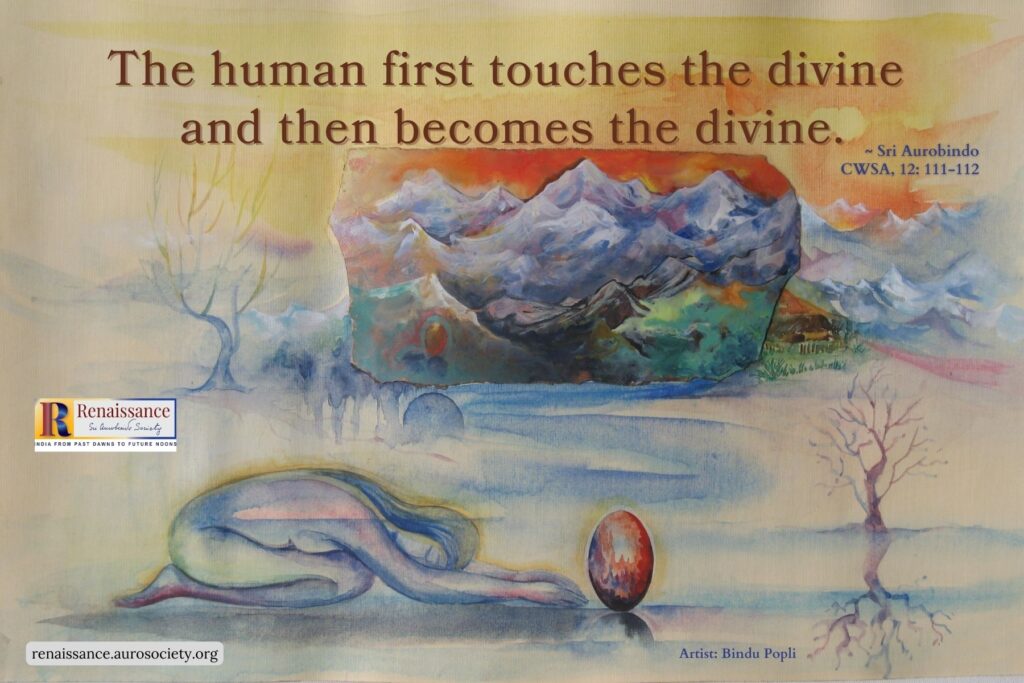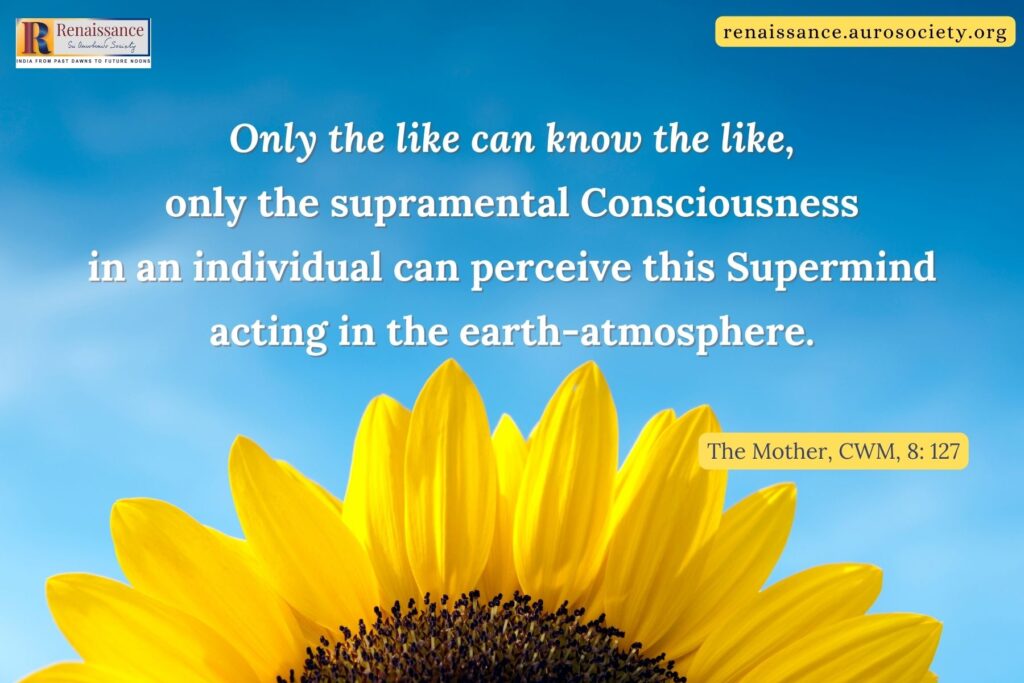Editor’s note: The author presents a reflective account of his evolving understanding of the nature of money and developing a yogic approach to engaging with money. Readers will also find insights on the high ideals set by the Mother regarding the attitude toward personal possession, especially if one aspires to be part of Auroville, the city the earth needs.

Sri Aurobindo once wrote:
When we have passed beyond enjoyings, then we shall have Bliss. Desire was the helper; Desire is the bar.
~ CWSA, Vol. 13, p. 199
When we have passed beyond individualising, then we shall be real Persons. Ego was the helper; Ego is the bar.
The Mother expands further on it:
It is obvious that in order to come out of the state of the original inconscience desire was indispensable, for without desire there would have been no awakening to activity. But once you are born into consciousness, this very desire which helped you to come out of the inconscience prevents you from liberating yourself from the bonds of matter and rising to a higher consciousness.
It is the same thing for the ego, the self. In order to pass on to a higher plane, one must first exist; and to exist one must become a conscious, separate individual, and to become a conscious separate individual, the ego is indispensable, otherwise one remains mingled with all that lies around us.
But once the individuality is formed, if one wants to rise to a higher level and live a spiritual life, if one wants even to become simply a higher type of man, the limitations of the ego are the worst obstacles, and the ego must be surpassed in order to enter the true consciousness.
~ CWM, Vol. 8, pp. 367-368
When I read this, it gave such a beautiful perspective that everything in life has its value and rightful place, and by understanding it we can transcend the duality of good and bad, right and wrong. Desire and Ego have a certain context for their existence, and there is also a context in which we need to dissolve them. Similarly, in our everyday life today there is a context in which money has a role, and there is also a context and stage in our evolution where we need to go beyond it.
Personal Journey
I was 17 years old when I started working professionally in the financial markets. Very soon I was also working in the computer software industry. It was really helpful to earn money in that phase of life; it helped me become financially self-sufficient to pay for my college fees, personal needs and wants, and also contribute towards the family’s household expenses. But by the time I turned 24, it started becoming clear to me that I needed to step out of what is often called a “corporate rat-race” and take up work which was more meaningful.
By then, I had also developed deep interest in Yoga and spirituality. And questions such as who is this ‘I’ truly and what is the purpose of life had started becoming important. While studying Patanjali’s Yogasutra, which speaks of Yama and Niyama as the foundation for living Yoga as a way of life, the dichotomy between some of the yogic principles and the economic principles came to the foreground.
For instance, the principle of अपरिग्रह / aparigraha suggests that one’s material possessions should include only what is necessary at a particular stage in life. Accumulation and hoarding are discouraged. But the dominant economic systems are designed to drive people and countries to get into the race of production, consumption, accumulation etc.
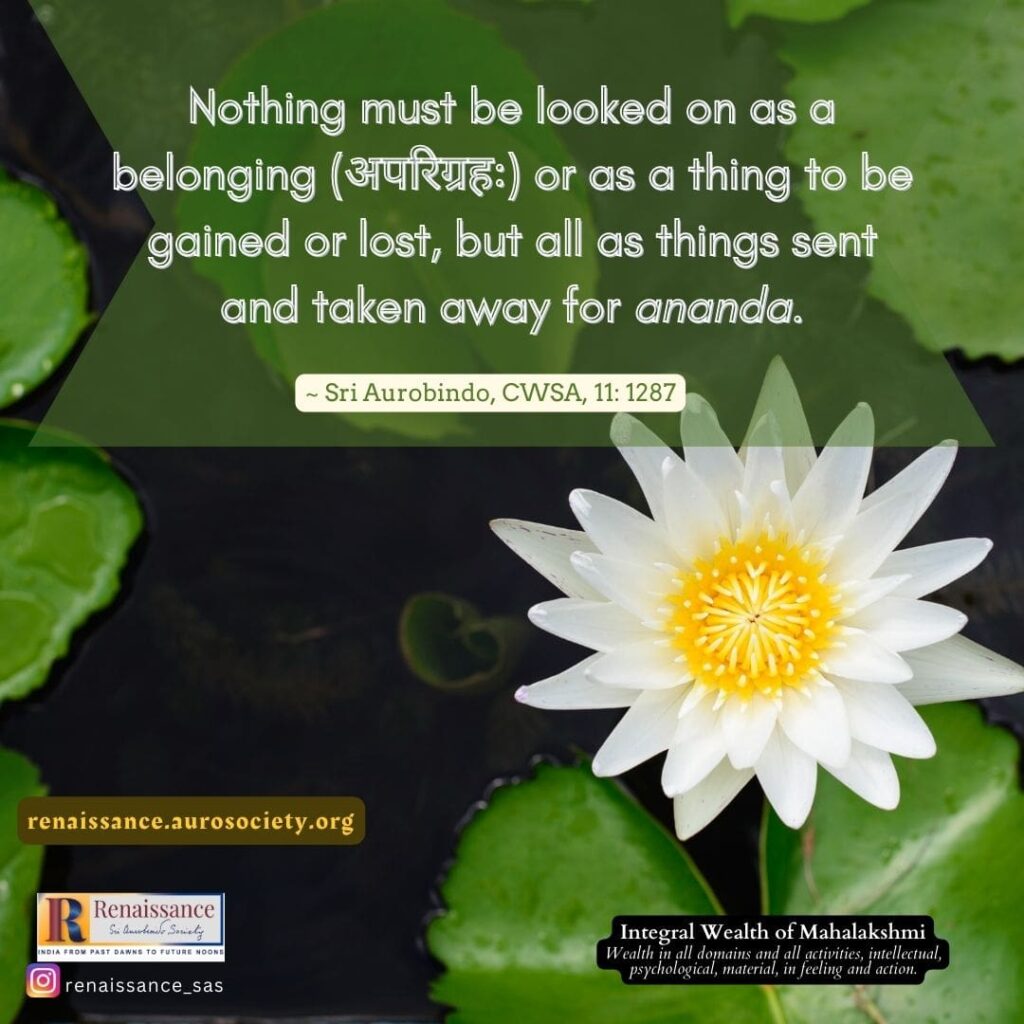
It was also puzzling to see several global issues ranging from climate crisis to people not having access to basic needs of food, clothing, shelter, healthcare, education, love, dignity etc. Hence working in the finance and technology sector to earn more money and accumulating possessions did not give meaning to life. In fact, it felt like a big hindrance towards real progress.
I started exploring more meaningful ways of living and within a few months decided to leave Mumbai, where I was born and had lived the first 25 years of my life. I relocated to Goa to work in a non-profit organization which also believed in team members living together with certain shared values so that workplace becomes a lifeplace. A new adventure of life began. Having some money in the bank account was helpful to make this shift, and yet depending on it felt like a hindrance.
Fast Forward to Sri Aurobindo and The Mother
I have experienced time and again that when the student is ready, the master appears. Between 2013 and 2015, I received several hints from the universe to connect with Sri Aurobindo. It included receiving the gift of a book titled “Sri Aurobindo or The Adventure of Consciousness” written by Satprem. Later a 93-year old disciple of Vinoba Bhave from Samanvaya Ashram in Bodhgaya insisted that I must read about Sri Aurobindo and his vision of Supramental transformation. It led me to start reading Sri Aurobindo’s writings and gradually receiving his guidance in the spirit of what he calls “All Life is Yoga.”
His writings on Money and Economy were very refreshing and deeply insightful. In September 2016, I visited Pondicherry and Auroville for the first time (perhaps, first time in the current body). I was here with my wife and our 8-year-old daughter. Coming to Auroville instantly felt like “Home” and when I read the Auroville Charter, A Dream and To be a True Aurovilian, all written by The Mother, the inner voice said a clear YES to participate in this experiment called Auroville.
When I spoke to my wife about the intention of moving to Auroville, she also expressed the same inner feeling and said yes. Grace.
During this one-week visit, we got admission for our daughter in a school here, found volunteering work which felt very enriching and also booked a place to stay in a guesthouse for long-term. Having a little bit of money in the bank account was the helper. Yet again depending on it felt like a hindrance. We went back to Goa to pack our bags and returned to Auroville in October 2016 and on my 40th birthday started another beautiful adventure in life.
The Synthesis
Life between the age of 25 to 40 had been quite a rollercoaster ride. Even though I had stepped out of the race for accumulation and was doing work which felt more meaningful, the complexity of balancing the inner and outer life while living in a city that still operates within the pushes and pulls of a consumption-driven economy became a part of an intense yoga sadhana. It came with its fair share of struggle and suffering as well as effortless service and joy.
During this time, I was reading and taking spiritual guidance from a wide range of wisdom traditions across the world. I also visited many Ashrams and spiritual communities to witness and experience how the inner quest and outer manifestation come together in everyday living. Many experiments in the spirit of gift economy made me realize the power of multiple forms of wealth beyond money.
And when I started reading Sri Aurobindo and The Mother, it felt as if several pieces of jigsaw puzzles were coming together beautifully and forming an integrated view of life rooted in Integral Yoga. It is invigorating to read Sri Aurobindo saying that it is “quite possible for a man to do business and make money and earn profits and yet be a spiritual man, practise Yoga, have an inner life.” (CWSA, Vol. 35, p. 770)
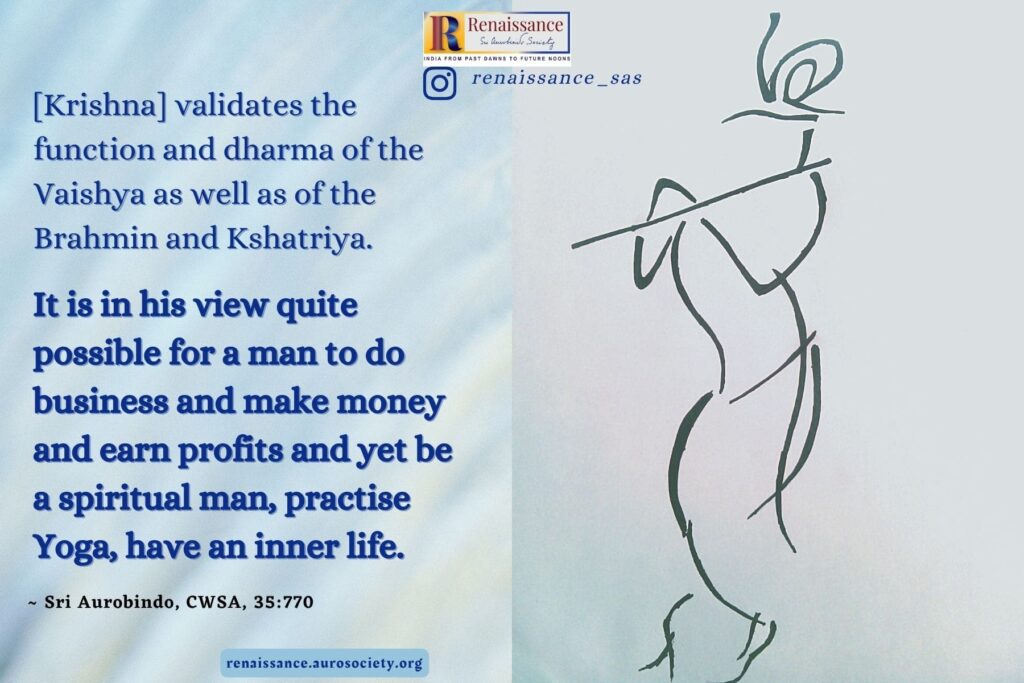
Money as a Force, a Tool, a Proxy
One can look at the what, why, where, when, who and how regarding money in myriad ways. At a simple level one can see it as a wonderful tool that allows you to measure value and facilitate exchange. Some people also suggest that in economies where the role of money has become quite widespread, it has become a proxy for trust and quite a poor one at that.
When I first read Sri Aurobindo’s writings on money, it was a revelation like no other. Here is what he wrote in the beginning of chapter 4 in the book ‘The Mother’:
Money is the visible sign of a universal force, and this force in its manifestation on earth works on the vital and physical planes and is indispensable to the fullness of the outer life. In its origin and its true action it belongs to the Divine. But like other powers of the Divine it is delegated here and in the ignorance of the lower Nature can be usurped for the uses of the ego or held by Asuric influences and perverted to their purpose. This is indeed one of the three forces – power, wealth, sex – that have the strongest attraction for the human ego and the Asura and are most generally misheld and misused by those who retain them.
The seekers or keepers of wealth are more often possessed rather than its possessors; few escape entirely a certain distorting influence stamped on it by its long seizure and perversion by the Asura. For this reason most spiritual disciplines insist on a complete self-control, detachment and renunciation of all bondage to wealth and of all personal and egoistic desire for its possession. Some even put a ban on money and riches and proclaim poverty and bareness of life as the only spiritual condition. But this is an error; it leaves the power in the hands of the hostile forces.
To reconquer it for the Divine to whom it belongs and use it divinely for the divine life is the supramental way for the Sadhaka.
You must neither turn with an ascetic shrinking from the money power, the means it gives and the objects it brings, nor cherish a rajasic attachment to them or a spirit of enslaving self-indulgence in their gratifications. Regard wealth simply as a power to be won back for the Mother and placed at her service.
All wealth belongs to the Divine and those who hold it are trustees, not possessors. It is with them today, tomorrow it may be elsewhere. All depends on the way they discharge their trust while it is with them, in what spirit, with what consciousness in their use of it, to what purpose.
~ CWSA, Vol. 32, p. 10
This passage provides such an expansive perspective on money and its place in Integral Yoga sadhana.
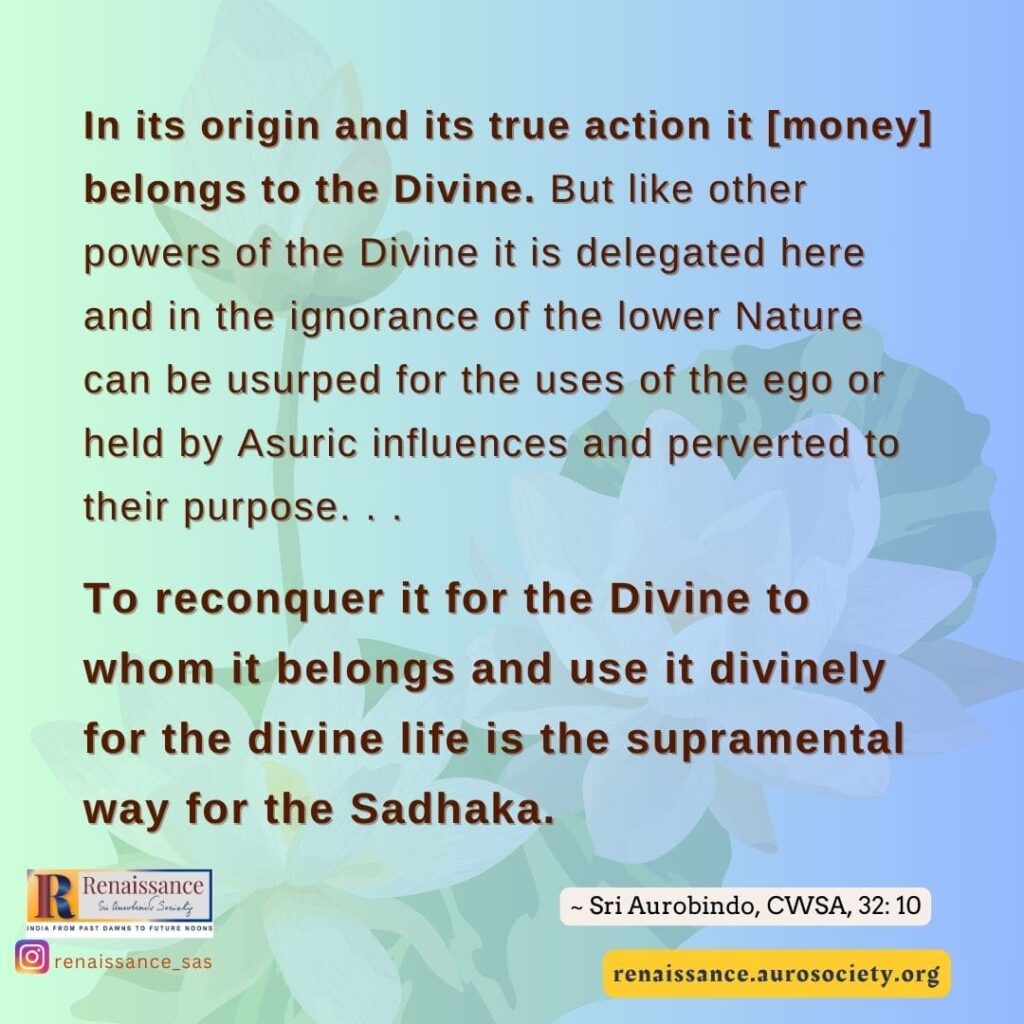
Six Enemies Within
In the ancient Indian wisdom we find a mention of six impurities of the mind that block the inner progress. They are
- काम (craving, lust)
- क्रोध (anger, aversion)
- लोभ (greed, avarice)
- मोह (delusion, attachment)
- मद (arrogance, egoism)
- मात्सर्य (jealousy, envy)
The manner in which the money-force operates in the present economic system, it can lure us in many ways with baits to trap us into strengthening these six impurities within. How do we engage with money consciously and continue the process of चित्तशुद्धि, inner cleansing?
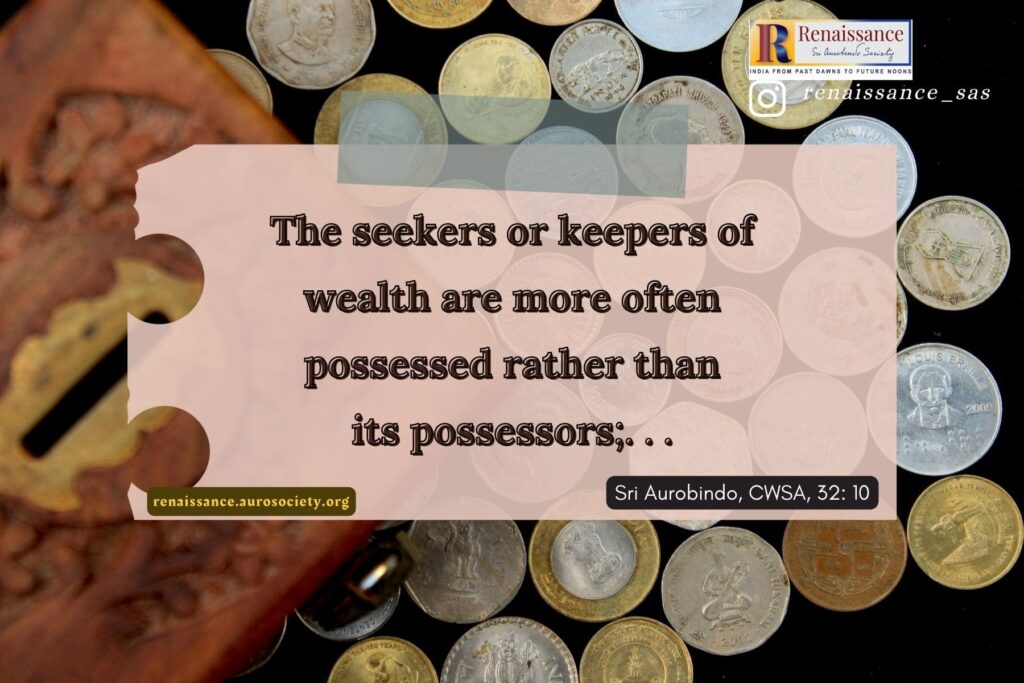
Also read:
The Stairway of Yoga
Growth of Consciousness
One of the key factors to evaluate whether engagement with the money-force is a helper or a hindrance can be to reflect on whether it is widening the consciousness or narrowing it. The Mother once wrote:
The conditions in which men live on earth are the result of their state of consciousness. To seek to change these conditions without changing the consciousness is a vain chimera.
Those who have been able to perceive what could and ought to be done to improve the situation in the various domains of human life – economic, political, social, financial, educational and sanitary – are individuals who have, to a greater or lesser extent, developed their consciousness in an exceptional way and put themselves in contact with higher planes of consciousness. . . .
. . . collective progress and individual progress are interdependent.
Before the individual can take a leap forward, at least a little of the preceding progress must have been realised in the collectivity. A way must therefore be found so that these two types of progress may proceed side by side.
~ CWM, Vol. 12, pp. 39-40
When I came to Auroville in 2016 and spontaneously decided to join this experiment, I didn’t know anyone personally here. I had no idea that the Sri Aurobindo Ashram, Sri Aurobindo Society and Auroville are three different entities. So the initial period was an interesting adventure to discover the ground realities.
In ‘A Dream’ The Mother mentions:
For in this ideal place money would no longer be the sovereign lord; individual worth would have a far greater importance than that of material wealth and social standing. There, work would not be a way to earn one’s living but a way to express oneself and to develop one’s capacities and possibilities while being of service to the community as a whole, which, for its own part, would provide for each individual’s subsistence and sphere of action.
~ CWM, Vol. 12, p. 93
The Auroville Charter begins with the point:
Auroville belongs to nobody in particular. Auroville belongs to humanity as a whole. But, to live in Auroville, one must be a willing servitor of the Divine Consciousness.
~ CWM, Vol. 13, p. 193
The Mother’s guidance on how to be a true Aurovilian includes:
The fulfilment of one’s desires bars the way to the inner discovery which can only be achieved in the peace and transparency of perfect disinterestedness.
. . .The Aurovilian should lose the sense of personal possession. For our passage in the material world, what is indispensable to our life and to our action is put at our disposal according to the place we must occupy.
The more we are consciously in contact with our inner being, the more are the exact means given to us.
~ CWM, Vol. 13, p. 208
And when this was to be published at the end of 1971, she added:
The only true freedom is the one obtained by union with the Divine.
~ CWM, Vol. 13, p. 215
One can unite with the Divine only by mastering one’s ego.
These words energize every time I read them.
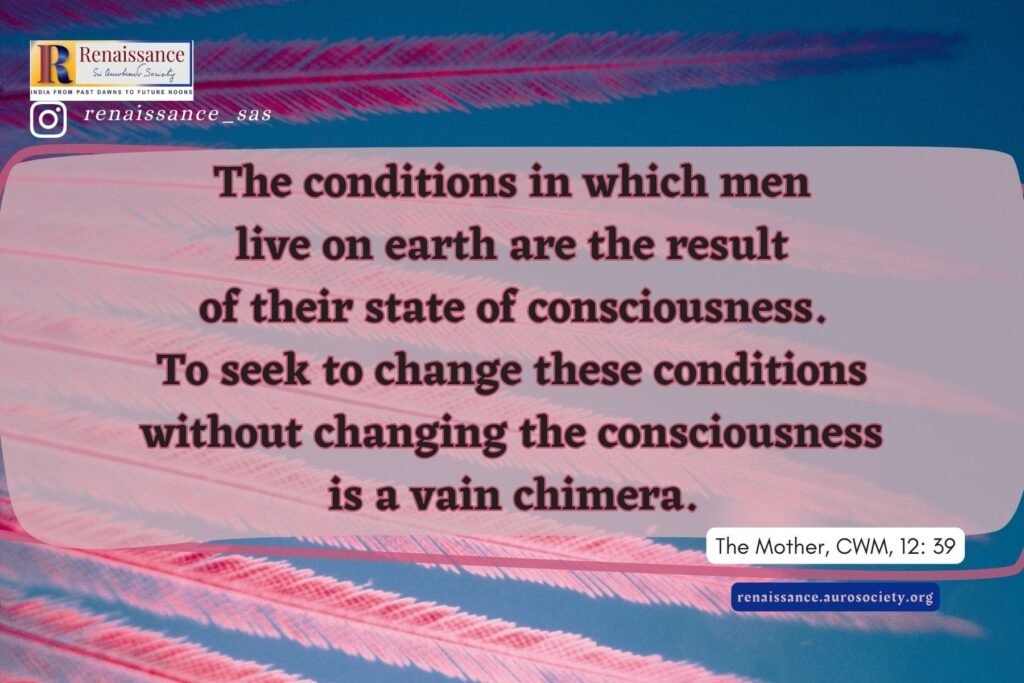
Even though the present manifestation of Auroville is far from the high ideals set by The Mother, a lot of commendable and beautiful things have emerged so far. The eyes and minds of ‘Economists’ miss seeing and understanding the value of the work that is happening here. Perhaps their minds are too preoccupied in preventing or dealing with the financial and economic crises that keep happening. While I am writing this article, there is news coming about three banks in the US collapsing.
In The Human Cycle, Sri Aurobindo wrote:
The aim of its (a spiritualised society’s) economics would be not to create a huge engine of production, whether of the competitive or the cooperative kind, but to give to men—not only to some but to all men each in his highest possible measure—the joy of work according to their own nature and free leisure to grow inwardly, as well as a simply rich and beautiful life for all.
~ CWSA, Vol. 25, p. 257
Reflecting on these words, I feel Auroville has done many good experiments in this direction.
It is a work-in-progress. It may also look quite messy or confusing from the outside, just as one may feel when one tries to see what is inside a pupa at the stage in between the caterpillar and the butterfly.
Personally it feels like a big blessing and a sense of deep gratitude to be a part of the Auroville experiment — a playground to dissolve personal desires and egos so that we can ultimately arrive at a group-soul. The goal is to truly become willing servitors of the Divine Consciousness to serve “humanity as a whole” and pave the way for “New Creation.”
With all humility I would say that one of the key challenges for humanity at large and also for Auroville, because it is a laboratory for the earth’s consciousness, is to discern the context in which money is a helper or a hindrance and to go beyond it.
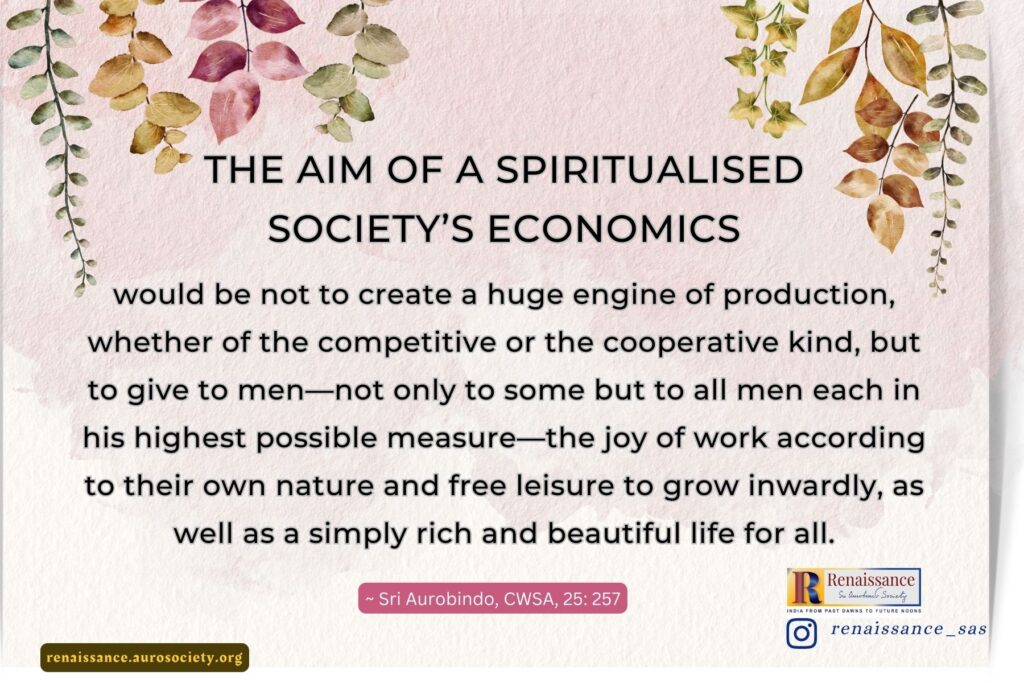

About the author:
In the search for ‘Truth’, Deven Shah has explored various dimensions of money while working in the personal finance and technology sector for around 20 years. He got deeply influenced by Sri Aurobindo and The Mother’s consciousness and in 2016 he joined Auroville where he is an instrument for various experiments in Integral Education and the study of Sanskrit.
~ Design: Beloo Mehra

